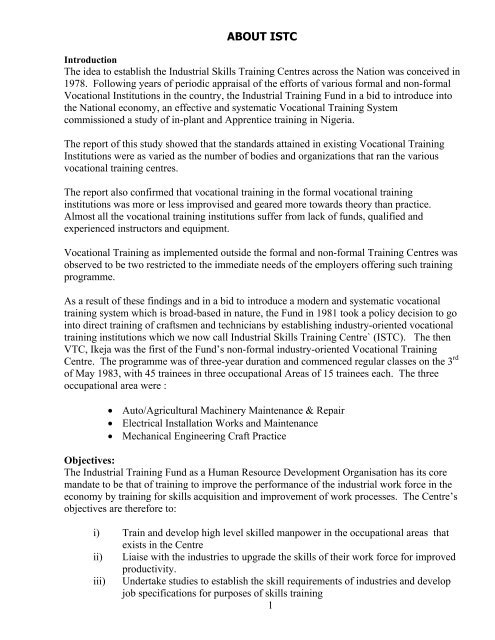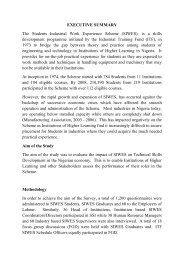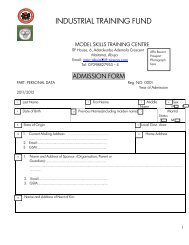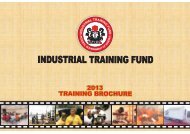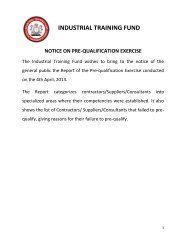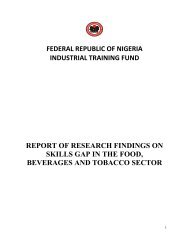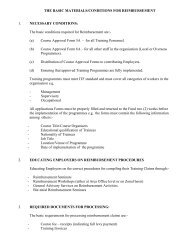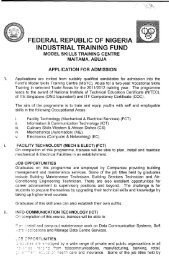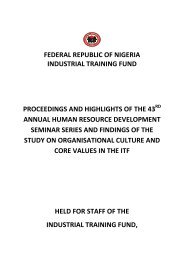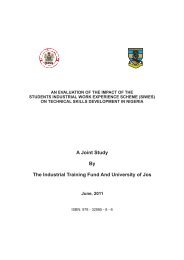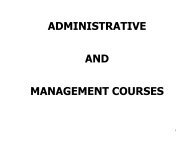ABOUT ISTC - ITF Nigeria
ABOUT ISTC - ITF Nigeria
ABOUT ISTC - ITF Nigeria
Create successful ePaper yourself
Turn your PDF publications into a flip-book with our unique Google optimized e-Paper software.
<strong>ABOUT</strong> <strong>ISTC</strong><br />
Introduction<br />
The idea to establish the Industrial Skills Training Centres across the Nation was conceived in<br />
1978. Following years of periodic appraisal of the efforts of various formal and non-formal<br />
Vocational Institutions in the country, the Industrial Training Fund in a bid to introduce into<br />
the National economy, an effective and systematic Vocational Training System<br />
commissioned a study of in-plant and Apprentice training in <strong>Nigeria</strong>.<br />
The report of this study showed that the standards attained in existing Vocational Training<br />
Institutions were as varied as the number of bodies and organizations that ran the various<br />
vocational training centres.<br />
The report also confirmed that vocational training in the formal vocational training<br />
institutions was more or less improvised and geared more towards theory than practice.<br />
Almost all the vocational training institutions suffer from lack of funds, qualified and<br />
experienced instructors and equipment.<br />
Vocational Training as implemented outside the formal and non-formal Training Centres was<br />
observed to be two restricted to the immediate needs of the employers offering such training<br />
programme.<br />
As a result of these findings and in a bid to introduce a modern and systematic vocational<br />
training system which is broad-based in nature, the Fund in 1981 took a policy decision to go<br />
into direct training of craftsmen and technicians by establishing industry-oriented vocational<br />
training institutions which we now call Industrial Skills Training Centre` (<strong>ISTC</strong>). The then<br />
VTC, Ikeja was the first of the Fund’s non-formal industry-oriented Vocational Training<br />
Centre. The programme was of three-year duration and commenced regular classes on the 3 rd<br />
of May 1983, with 45 trainees in three occupational Areas of 15 trainees each. The three<br />
occupational area were :<br />
• Auto/Agricultural Machinery Maintenance & Repair<br />
• Electrical Installation Works and Maintenance<br />
• Mechanical Engineering Craft Practice<br />
Objectives:<br />
The Industrial Training Fund as a Human Resource Development Organisation has its core<br />
mandate to be that of training to improve the performance of the industrial work force in the<br />
economy by training for skills acquisition and improvement of work processes. The Centre’s<br />
objectives are therefore to:<br />
i) Train and develop high level skilled manpower in the occupational areas that<br />
exists in the Centre<br />
ii) Liaise with the industries to upgrade the skills of their work force for improved<br />
productivity.<br />
iii) Undertake studies to establish the skill requirements of industries and develop<br />
job specifications for purposes of skills training<br />
1
iv) Empower the youth through skills acquisition programme aimed at job creation<br />
and enterpreneurship development<br />
v) Design and implement booster courses based on industry’s perceived needs<br />
vi) Certify and issue trainees with <strong>ITF</strong> competency certificate at the successful<br />
completion of the programme.<br />
New Programmes and Proposal<br />
In view of the fast technological development in every facet of industrial activity, the<br />
Management of the Fund is now re-equipping the Centre with the most modern tools and<br />
equipment to align it with the pace of industrial skills needed for today’s workforce.<br />
The occupational areas in the Centre have therefore been expanded to include:<br />
- Communication and Information Technology<br />
- Tool and Die Making<br />
- Welding and Fabrication<br />
- Refrigeration and Airconditioning<br />
A steady demand exists in the industry for these trades and to be successful in these fields,<br />
trainees must have a desire and ability to utilize many hand skills to industry-accepted<br />
standards.<br />
New Structure of <strong>ISTC</strong> Vocational<br />
Training Programme<br />
The Programme Structure - (Proposed)<br />
The Centre is now proposing a two-year vocational training programme centred on skills<br />
acquisition and structured in four phases as below:<br />
Duration -<br />
2yrs<br />
PHASE I PHASE II PHASE III PHASE IV<br />
Basic<br />
Engineering<br />
Skills Training<br />
Applied<br />
Industrial<br />
Skills Training<br />
Industrial<br />
Attachment<br />
Project Work<br />
& Certification<br />
24 weeks 40 weeks 28 weeks 12 weeks<br />
The reduction of excessive vacations and running the Centre in an industrial-like manner. will<br />
enable the Centre to complete any of the programmes in two years. For any of these trades in<br />
the Centre, opportunities for advancement are favorable either by employment or by<br />
establishing a business enterprise.<br />
2
Organisational Structure - (Proposed)<br />
The proposed Centre structure which depicts all the trade areas in the Centre is shown below:<br />
Proposed Staffing Plan - <strong>ISTC</strong> Ikeja<br />
Director<br />
Secretary<br />
Office Staff<br />
Auto/Agric Comm/Info. Mech. Refrig. & Tool & Die Elect. Inst. Welding &<br />
Tech Craft Air Cond. & Maint. Fab.<br />
Senior<br />
Instructor<br />
Senior<br />
Instructor<br />
Senior<br />
Instructor<br />
Senior<br />
Instructor<br />
Senior<br />
Instructor<br />
Senior<br />
Instructor<br />
Senior<br />
Instructor<br />
Instrs. Instrs. Instrs. Instrs. Instrs. Instrs. Instrs.<br />
Service Units of the Centre<br />
Admin<br />
Admin.Officer<br />
Finance<br />
Snr. Acct.<br />
Office<br />
Staff<br />
Office<br />
Staff<br />
3
Auto/Agricultural Equipment Maintenance Repair<br />
This programme provides an opportunity for trainees to work with variety of Auto/Agric<br />
equipment. Trainees will explore new developments In the auto industry such that on<br />
completion of the 2-year programme, they would have acquired sound practical and<br />
theoretical skills adequate to secure them employment.<br />
Below is shop flow illustration by the instructor to the trainees.<br />
Using a manual pump to test an engine nozzle<br />
Using computerized engine analyzer to establish the performance of a petrol engine.<br />
4
Electrical Installation and Maintenance Programme<br />
The programme on electrical installation and maintenance is of two years duration aimed at<br />
developing the skills of trainers in industrial electrical installations and provide sound<br />
knowledge of electrical equipment maintenance.<br />
a<br />
b<br />
The photograph above shows an instructor demonstrating to trainees in the electrical<br />
workshop (a) the process control concepts and technique for the control of industrial process<br />
variables, eg. Pressure flowrate etc. (b) Demonstration on electro-mechanical control<br />
techniques.<br />
Mechanical Engineering Craft Practice Programme<br />
This programme trains the trainees to operate engine lathe, drill presses, milling machines,<br />
grinders and special purpose machines to shape metal workpieces to specification. The<br />
programme lasts for two years and offers trainees additional opportunity to become<br />
competent in various machine operations and set ups. Work is done with blueprints,<br />
specifications and machine tool problem solving.<br />
An instructor is seen demonstrating to the trainee how to set up a workpiece on a milling<br />
machine with the use of a dial indicator.<br />
5
Communication and Information Technology Programme<br />
The programme on Communication and Information Technology offers trainees the skill to<br />
adopt and secure employment in high technology organisations that has to do with<br />
communication and information equipment. Todays industrial processes require verse<br />
knowledge in programming and computation. The two-year programme will therefore<br />
address the needs of the industries in this direction.<br />
(a)<br />
Above at (a) and (b), the instructors are clarifying some points to the trainees on<br />
Communication and Information Technology equipment.<br />
(b)<br />
6
Tool and Die Programme<br />
This programme is designed to enable trainees to be able to produce moulds and die for<br />
purposes of replication of engineering components. The intricate machining process involved<br />
in this programme enables trainees to acquire very high skills in machining and problem<br />
solving techniques. This programme is expected to be in full swing within the next 24<br />
months.<br />
Welding and Fabrication Programme<br />
Vocational programme in Welding & Fabrication offers 2 years training in the areas of oxyacetylene<br />
welding, arc welding, Tig (Tungsten Inert Gas), Mig (Metalic Inert Gas) and<br />
welding in the flat, vertical and overhead positions. Weld exercises selected for this course<br />
include the common types of weld joints used in industry.<br />
Welding fabrication provide knowledge of blueprint reading, interpretation of shop sketches,<br />
bench layout and Fabrications in light and heavy gauge materials.<br />
Above is an instructor demonstrating to trainees on how to strike<br />
and achieve a good weld on a work piece<br />
Refrigeration and Air-conditioning Programme<br />
The industrial application of refrigeration & air-conditioning is growing by the day. The<br />
programme which lasts for two years enables trainees to acquire the skills necessary to<br />
maintain and keep process plants running to specification. The domestic refrigeration and air<br />
conditioning is also covered in the programme.<br />
The use of refrigeration and air-condition trainers facilitate the understanding of the<br />
principles and application of refrigeration and air-conditioning system.<br />
7
Above is an instructor demonstrating to trainees on how to refill gas in a domestic<br />
refrigerator in refrigeration and Air Conditioning Workshop<br />
The Centre’s programmes are offered in partnership with employers of labour whose roles<br />
are to absorb the trainees during industrial attachment and coach them through practical<br />
exercises based on their training job specifications.<br />
The contribution made by industries in the skill training efforts of the Centre is remarkable, and<br />
invaluable.<br />
8
Industrial Skills Training Centre<br />
Contact Us<br />
The Industrial Skills Training Centre is located in Ikeja – a city within Lagos.<br />
Easily contacted with the address:<br />
The Director,<br />
Industrial Skills Training Centre,<br />
(Industrial Training Fund),<br />
Olorunfunmi Street (Behind Philips)<br />
Ojota – Ikeja.<br />
Tel. 01-4964155, 44817657<br />
E-mail: itfistk@Yahoo.com.<br />
Our Role:<br />
Meeting the challenges of the changing nature of work and future skills<br />
requirements.<br />
9


